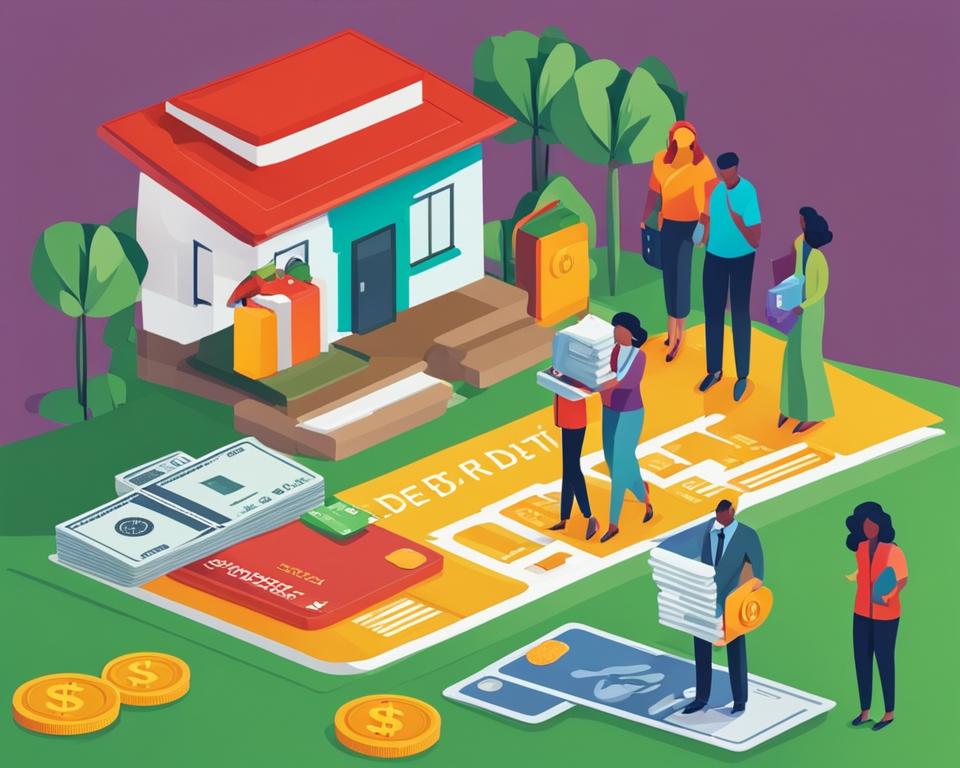In the world of finance, achieving financial clarity often involves exploring various debt relief options to manage debt efficiently. One such strategy that has gained prominence for its ability to streamline payments is debt consolidation. This approach helps individuals merge their outstanding debts—usually high-interest loans like credit card bills—into a single, potentially more manageable payment plan. Touted as a beacon of hope for many, debt consolidation can offer a clearer and simplified path towards financial freedom, provided that it is executed with a thorough understanding of its mechanisms and implications.
But what does embarking on this financial journey entail? For starters, debt consolidation usually requires an analysis of one’s current debt landscape followed by the selection of an appropriate method to consolidate various debts into one loan with a lower interest rate. The goal is simple: simplify your monthly bills, harness the reins of your financial obligations, and steer towards a debt-free horizon with more ease and less strain on your wallet.
Key Takeaways
- Determining the most suitable consolidation strategy may lead to reduced interest rates and monthly payments.
- An essential step is to assess the overall financial situation to ensure the total debt is manageable.
- Financial clarity is achieved when consolidation enables a clear and sustainable plan for debt repayment.
- Understanding debt relief options encompasses knowing when consolidation is appropriate, and advantageous.
- Execute debt consolidation with informed decision-making to successfully manage debt and regain financial control.
The Basics of Debt Consolidation
Debt consolidation is increasingly becoming a strategy for individuals seeking to improve their financial health and manage their debt more effectively. By defining what debt consolidation is and understanding how it operates, one can assess if this route can ease the complexity of personal financial obligations.
Definition and Purpose of Debt Consolidation
Debt consolidation is a financial approach designed to simplify an individual’s debt payments. By consolidating debt loans, one obtains the ability to merge multiple high-interest debts—such as credit card bills—into a single, more manageable and often lower-interest loan. The overarching purpose of this strategy is to streamline monthly payments, reduce the interest rate burden, and ultimately facilitate a speedier debt payoff.
How Does Debt Consolidation Work?
The process of debt consolidation can be fairly straightforward but requires careful planning and consideration. It starts with the individual taking out a new loan or credit line that is large enough to cover their outstanding debts. Once the debts are paid off, or ‘consolidated,’ the individual is then responsible for paying back the new loan, which ideally comes with more favorable terms. This can mean lower monthly payments, lower interest rates, and a fixed payment schedule—factors that contribute to making debt more manageable and less of a financial strain.
To consolidate debt loans, consumers often use balance-transfer credit cards with low introductory rates or fixed-rate consolidation loans. The objective is to not just simplify payments, but also to save money over time by lowering the overall cost of debt. Here is a fundamental question many people ask in this context: “What is debt consolidation and how does it work?” Below, this concept is unpacked in greater detail to provide clarity and guidance on its mechanisms and benefits.
What is debt consolidation and how does it work?
The journey to financial freedom often begins with understanding the debt consolidation process, and how to effectively manage and reduce one’s financial burdens. Debt consolidation is a strategic financial step for those looking to simplify multiple debt repayments into one manageable plan.
Understanding the Debt Consolidation Process
Embarking on the debt consolidation process involves taking out new credit, which is used to pay off multiple existing debts, ultimately resulting in a single monthly payment. This method is advantageous for its simplicity and the potential to secure a lower interest rate which can alleviate the financial pressure over time. The success of this process rests on identifying the most appropriate consolidation option and executing the transition carefully and with clear understanding.
Types of Debt That Can Be Consolidated
Many types of unsecured debt can be wrapped into a debt consolidation plan. These commonly include credit card debts, personal loans, and medical bills—expenses that usually carry high-interest rates and challenging repayment terms. Through consolidation, these can be effectively managed, often yielding significant savings on interest charges and streamlining the repayment process.
| Debt Type | Typical Interest Rate | Consolidation Options |
|---|---|---|
| Credit Card Debt | 15-25% | Balance-transfer credit card, Personal consolidation loan |
| Personal Loans | 5-36% | Debt consolidation loan |
| Medical Bills | Varies | Personal loan, Payment plan negotiation |
Ultimately, the debt consolidation process and understanding how to consolidate debt effectively are key steps for anyone aiming to regain control over their financial health. With appropriate planning and careful consideration of the types of debt that can be consolidated, individuals can take decisive action towards a more stable and secure financial future.
Evaluating When Debt Consolidation Makes Sense
Embarking on a path toward financial stability often includes weighing the benefits of debt consolidation. This strategic financial decision can provide substantial relief and order to one’s financial life, especially when it aligns with their personal economic situation. To better understand when debt consolidation is most effective, it’s essential to consider its impact on debt management.
For many, consolidating debt is prudent when their combined monthly debt payments, inclusive of housing expenses, remain under 50% of their gross monthly income. This threshold ensures there’s ample room in one’s budget to comfortably address their consolidated payment, without stretching their finances too thin. Moreover, maintaining a robust cash flow is key, as it backs the ongoing commitments required in a debt repayment plan.

When the individual’s credit standing is healthy—an indicator that they’ve managed their borrowing and repayment activities responsibly in the past—they’re more likely to secure debt consolidation tools with favorable terms. A positive credit history may lead to lower interest rates and better loan terms, reducing total debt over the course of the repayment period. Additionally, realistic timelines must be in place; typically, the total debt should be resolvable within a five-year timeframe to ensure that consolidation remains a manageable and effective tool.
Fiscal responsibilities come with the delicate task of balancing income against outgoings. When the scales tip in favor of debt consolidation, it’s often because an individual has carefully considered their comprehensive debt management strategy and the long-term dividends it could potentially yield.
- Monthly debt payments (including mortgage or rent) are less than 50% of gross income.
- Enough cash flow remains after consolidation to cover living expenses and emergency savings.
- Credit is sound to qualify for favorable interest rates and terms.
- Total debt is manageable and can be resolved within a five years’ period.
Apart from the financial prerequisites, debt consolidation must be approached with an understanding that it is a method to streamline debt repayment, not a cure for fundamental financial issues. If the underlying causes for accumulating debt are not addressed—such as habitual overspending or inadequate savings—consolidation may at best provide a temporary fix. Thus, while the immediate advantages are tangible—a lower interest rate or a single, simplified monthly payment—the long-term success of debt consolidation goes hand in hand with disciplined personal debt management practices.
Methodologies of Debt Consolidation
When exploring how to consolidate debt effectively, it is essential to compare the diverse methodologies available. Opting for the right strategy can significantly impact your financial stability and progress towards debt freedom. Whether through debt consolidation companies or personal financial initiatives, understanding each method’s nuances is key to making an informed decision.
Balance-Transfer Credit Cards
Consumers often turn to balance-transfer credit cards as a means to temporarily halt the growth of interest on their debt. These cards usually offer an introductory period with 0% APR, giving debtors the chance to pay down the principal without accruing additional interest.
Fixed-Rate Debt Consolidation Loans
Another popular option is a fixed-rate debt consolidation loan. Unlike variable interest rates, these loans establish a consistent monthly payment over a set term, which simplifies budgeting and ensures that payments chip away at the debt’s principal.
Home Equity Loans and 401(k) Loans
Beyond credit cards and personal loans, some individuals may consider leveraging their home equity or borrowing against their 401(k) plans. While potentially lowering interest rates, these loans should be approached with caution due to their associated risks, such as the possibility of losing one’s home or retirement funds.
| Method | Pros | Cons | Best for |
|---|---|---|---|
| Balance-Transfer Credit Cards | 0% intro APR, Simplify payments | Post-introductory rate hikes, Balance transfer fees | Short-term debt reduction |
| Fixed-Rate Loans | Consistent payments, Clear payoff schedule | May require good credit, Potential origination fees | Borrowers with stable income |
| Home Equity/401(k) Loans | Potentially low interest rates, Tax advantages | Risk to assets/retirement funds, Potentially long-term costs | Those with substantial equity or savings |
Ultimately, the choice of consolidation method should be aligned with the individual’s financial goals and the advisability of assuming any additional risks. Counsel from reputable debt consolidation companies can provide valuable guidance in charting a productive course towards debt consolidation and financial resilience.
Benefits of Consolidating Your Debt
Exploring the advantages of debt consolidation unfolds a myriad of financial benefits designed to alleviate the pressures of multiple debt repayments. Among the foremost debt consolidation benefits is the ability to reduce total debt through a potentially lower interest rate. By securing one loan to pay off several others, borrowers have the opportunity to lower their overall monthly payments, creating a more manageable financial landscape.
The simplicity of a single monthly payment not only streamlines one’s budgeting efforts but also trims down administrative tasks, reducing the risk of missed payments that can lead to negative implications on one’s credit report. It’s a step towards a clearer financial future with determined goals and transparent means to reach them.
A strategic debt consolidation plan sets a definitive timeline to reduce total debt, breaking free from the indefinite cycle associated with high-interest credit card debt. Below is a comparison that illustrates how consolidating various high-interest debts into one lower-interest option can potentially lower monthly payments and reduce the total interest paid over time:
| Debt Type | Interest Rate | Monthly Payment | Total Interest Paid |
|---|---|---|---|
| Credit Card A | 22% | $120 | $1,000 |
| Credit Card B | 19% | $90 | $700 |
| Personal Loan | 15% | $150 | $600 |
| Consolidation Loan | 10% | $300 | $1,200 |
As demonstrated in the table, the consolidated loan not only simplifies repayment but usually results in a lower total monthly payment and a substantial reduction in total interest paid. Addressing debt through consolidation becomes not only a pathway to financial relief but also a strategic move towards total debt liquidation.
However, debt consolidation is more than just a reduction in numbers; it’s about regaining control over one’s financial destiny. With dedicated commitment and a clear timeline, the journey to debt freedom becomes much more attainable.
Debt Consolidation Companies and Services
When it comes to managing overwhelming debt, many Americans turn to debt consolidation companies to help simplify their financial obligations. These companies play a pivotal role in aiding individuals to merge multiple debts into a single, more manageable payment plan. By understanding debt relief options, people can make informed decisions about their financial future.
Reputable debt consolidation services offer more than just loan products. They provide a suite of tools designed to foster smarter financial decisions, including personal assessments and helpful calculators. These resources assist consumers in evaluating whether consolidating their debts aligns with their personal financial strategy and long-term goals.
The cornerstone of these companies’ offerings is their ability to negotiate with creditors on behalf of their clients to secure lower interest rates and more favorable repayment terms. It is a transformative step that can significantly decrease the amount of money spent on interest, thereby speeding up the debt repayment process.
- Debt Analysis Tools: To begin the process, tools such as debt calculators help individuals understand the scope of their debt and potential savings from consolidation.
- Customized Plans: Each plan is tailored to the client’s unique financial situation, whether consolidating credit card debt, medical bills, or personal loans.
- Consumer Education: Alongside financial restructuring, these services often include educational resources aimed at promoting sound financial habits post-consolidation.
The path towards financial freedom isn’t devoid of complexities, yet with the expertise of qualified debt consolidation companies, it becomes far less daunting. These companies act as allies in your journey, ensuring that your steps towards debt relief are both measured and impactful.
The Financial Impact of Debt Consolidation
The journey towards financial stability often leads many to consider debt consolidation. By understanding the financial impact of debt consolidation, individuals can make informed decisions and potentially increase their savings. Merging multiple high-interest obligations into a singular, lower-interest loan can significantly reduce monthly outlays and streamline personal finances.
Calculating Your Savings with Debt Consolidation
One of the most compelling reasons to consolidate debt is the opportunity to calculate savings. The process involves comparing the current interest rates of individual debts against the potential rate of a consolidated loan. Using online debt consolidation calculators, one can see a quantifiable difference in monthly payments and long-term interest costs, providing a clearer financial picture and an impetus to pursue consolidation.
Long-term Financial Benefits
The long-term financial benefits of consolidating debt are often observed in the form of reduced interest charges. It not only simplifies the repayment process, but also accelerates the journey to becoming debt-free. Consolidated loans with structured payment terms create a predictable financial environment, where individuals are less likely to miss payments or default, ultimately promoting healthier credit histories and financial resilience.
Risks and Considerations in Debt Consolidation
While exploring debt consolidation as a means to manage multiple debts, it’s imperative to understand that this financial strategy comes with its own set of risks and considerations. The decision to consolidate should be weighed against these potential pitfalls to ensure a fully informed choice is made.
Potential Risks to Your Credit Score
One of the major concerns for borrowers considering debt consolidation is the credit score impact. When applying for a debt consolidation loan, the lender will perform a hard inquiry on your credit report. This action can temporarily reduce your credit score. Additionally, opening a new account, which is required to consolidate debts, may also lower the average age of your credit accounts, further affecting your score. However, it’s important to note that these dips can be mitigated by maintaining on-time payments and reducing your overall debt level.
Understanding Hidden Fees and Costs
Consolidation options often come accompanied by costs that may not be immediately apparent. Transfer fees or origination fees can add to the expense of consolidation, diminishing the initial perceived savings. It is advisable to thoroughly read the terms and conditions of any potential consolidation loan to uncover any hidden charges. Not doing so could lead to an unforeseen burden, affecting your overall financial stability.
| Consolidation Cost | Description | Potential Impact |
|---|---|---|
| Balance Transfer Fee | A percentage fee charged when transferring existing balances to a new credit card | Can reduce the cost-effectiveness of transferring balances |
| Origination Fee | An upfront fee charged by lenders for processing a new consolidation loan | Increases the overall cost of the loan |
| Closing Costs | Fees associated with finalizing the loan, often seen with home equity loans | Additional out-of-pocket expenses before the benefit of consolidation is realized |
| Annual Fees | Yearly charges that may be tied to some consolidation services | Continuous cost that can make debt paydown more expensive in the long run |
To navigate the risks of debt consolidation effectively, understanding the nuances and being prepared for the implications on your credit score and financial health is essential. With astute planning and a clear examination of costs and benefits, debt consolidation can be part of an effective strategy for achieving financial freedom.
How to Qualify for Debt Consolidation
The debt consolidation process may seem like a beacon of hope for those drowning in debt, but qualifying for debt consolidation requires meeting certain criteria. Lenders typically look for signs of financial stability and an ability to repay the loan. Understanding the qualifications can help individuals determine whether they are likely candidates for this debt relief strategy.

The road to qualifying begins with a thorough assessment of financial documents. Here’s a list of what you might need:
- Proof of income, such as recent pay stubs or tax returns
- A favorable credit score demonstrating creditworthiness
- Statements from all current debts
- Letters from creditors recognizing the debt amounts
Next, let’s look at a table that outlines common qualifications lenders consider during the debt consolidation process:
| Qualification | Description | Why It Matters |
|---|---|---|
| Credit Score | A reflection of your creditworthiness, based on credit history | Lenders often offer better rates to those with higher credit scores |
| Debt-to-Income Ratio | Total monthly debt payments compared to gross monthly income | A lower ratio suggests a greater ability to manage monthly loan payments |
| Collateral | Assets offered to secure the loan, such as property or vehicles | May be required for secured debt consolidation loans |
| Employment History | A stable work record indicating regular income | Assures lenders of continuous repayment capability |
Qualifying for debt consolidation is not an automatic process, and not all applicants will be approved. However, by understanding what information is critical to providers, individuals can better prepare themselves to navigate the debt consolidation process, making steps towards more manageable finances.
The Role of Credit Scores in Debt Consolidation
When exploring the avenue of debt consolidation, it’s crucial to grasp the pivotal role credit scores play in shaping your financial outcomes. Robust credit scores could unlock the gates to more attractive consolidation opportunities, paving the path for improved financial well-being.
How Your Credit Score Affects Your Options
Your credit score is a vital indicator banks and other financial institutions use to evaluate risk. High credit scores can lead to better interest rates and terms in debt consolidation loans or balance-transfer credit cards, while lower scores may limit options, potentially making consolidation less advantageous or even unachievable.
Improving Your Credit Score With Consolidation
Consolidating your debt can be a strategic move to improve your credit score, particularly if it assists in streamlining payment obligations. Consistent, on-time payments may positively impact your score as you reduce your credit utilization ratio and demonstrate financial responsibility.
| Credit Score Range | Effect on Debt Consolidation Options | Typical Interest Rates |
|---|---|---|
| Excellent (720-850) | Eligible for lowest rates and best terms | 10-12% |
| Good (690-719) | Competitive rates, wide range of options | 12-15% |
| Fair (630-689) | Modest rates, some options may be unavailable | 15-21% |
| Poor (300-629) | Limited options, higher interest rates | 21-36% |
Debt Consolidation Versus Debt Settlement
When individuals explore debt options, they often encounter two predominant strategies: debt consolidation vs. debt settlement. Both methods serve the purpose of alleviating financial strain but differ fundamentally in approach and implications.
Debt consolidation involves combining multiple debts into a single loan or payment plan to streamline monthly payments and, ideally, reduce interest rates. In contrast, debt settlement entails negotiating with creditors to pay a lump sum that’s less than the full amount owed. This method can lead to significant reductions in debt but may also have negative repercussions on credit standing.
| Aspect | Debt Consolidation | Debt Settlement |
|---|---|---|
| Objective | Combine debts into one payment | Negotiate to pay less than owed |
| Impact on Credit Score | Potentially positive over time | Often negative in short term |
| Monthly Payments | Potentially lower with reduced rates | Varies, could cease during negotiation |
| Debt Resolution | Structured over a set period | Can be faster if a settlement is reached |
| Costs | Possibly includes fees for balance transfers or loans | May include fees for settlement services |
| Suitability | For those with manageable debt seeking to simplify payments | For those unable to maintain regular payments, facing bankruptcy |
While exploring these debt options, consumers must consider their ability to make regular payments, their credit score goals, and their long-term financial well-being. Consulting with credit counselors or financial advisors can provide personalized guidance tailored to individual circumstances.
Ultimately, whether an individual chooses consolidation or settlement, being informed and proactive is key. By understanding the nuances between these options, one can make an educated decision that aligns with their financial goals and leads to a stronger fiscal future.
Effective Debt Management Tips Post-Consolidation
Successfully navigating the post-consolidation landscape hinges on robust debt management strategies. These are not just about staying on track with repayments but also ensuring that past patterns that led to debt are not repeated. Adopting a disciplined financial approach is imperative to maintaining a sound fiscal stance and mitigating the risk of future indebtedness.

Maintaining Financial Discipline
Financial discipline post-debt consolidation is about more than just making monthly payments; it revolves around a comprehensive understanding of personal finance. This includes creating and sticking to a realistic budget that accounts for income, expenses, and debt repayment. It is also important to regularly monitor credit reports and financial statements to catch any discrepancies and assess spending habits.
Strategies to Avoid Future Debt
Avoiding future debt requires a strategic approach that begins with foresight and planning. Establishing an emergency fund is one of the critical pillars to prevent the need for taking on additional debt during unforeseen circumstances. Additionally, employing debt-reduction techniques, such as the debt snowball or avalanche methods, can be powerful tools in combating the accumulation of new debt.
- Budgeting: Create a budget that allows for debt repayment while living within your means.
- Emergency Fund: Save a portion of your income as a safeguard against unexpected expenses.
- Spending Analysis: Regularly evaluate your spending patterns to identify areas for reduction.
- Debt Repayment Strategies: Consider methods like debt avalanche or snowball to prioritize debt payoff.
- Credit Monitoring: Keep a close eye on your credit report to ensure accuracy and progress.
Embarking on a journey free from the burden of debt is achievable with the right mindset and tools. Remember to keep these debt management tips at the forefront and to consistently avoid future debt, thus paving the way to a stable and secure financial future.
Alternatives to Debt Consolidation
When exploring debt options, it’s crucial to understand that debt consolidation isn’t the only path forward. There are multiple debt management alternatives that might better suit your financial profile and objectives. By considering a spectrum of methods, you’ll be empowered to make informed decisions that can bolster your financial stability.
One effective strategy for many is budget restructuring. This involves a thorough analysis and adjustment of your monthly spending and savings. By reallocating funds within your budget, you may find surplus capital to accelerate debt repayment without the need for consolidation.
The debt snowball and avalanche methods are popular repayment strategies for those who prefer a disciplined, structured approach without merging debts. These strategies emphasize paying off debts in a specific order to create momentum and psychological wins.
Seeking the guidance of a credit counselor can provide you with personalized advice tailored to your unique financial situation. These professionals can assist in establishing a realistic budget, setting financial goals, and sometimes even negotiating with creditors on your behalf.
For those with student loans, federal consolidation programs may present beneficial options that could lead to reduced monthly payments or loan forgiveness, depending on your career and income.
| Strategy | Description | Benefits |
|---|---|---|
| Budget Restructuring | Reallocate your monthly income towards high-priority debts. | Can free up funds without acquiring new loans; improves financial habits. |
| Debt Snowball Method | Focus on paying off the smallest debt first, then moving to the next smallest. | Quick wins boost confidence and encourage adherence to repayment plan. |
| Debt Avalanche Method | Target debts with the highest interest rates first, then proceeding to those with lower rates. | Saves money in the long term by reducing the amount of interest paid. |
| Credit Counseling | Work with finance professionals to negotiate debt terms and plan a budget. | Provides expert insight and potential creditor negotiations; educates on financial management. |
| Federal Student Loan Programs | Consolidation options for federal student loans. | May lower payments or qualify for forgiveness based on specific criteria. |
“It’s better to explore all avenues of debt relief before making a decision. What works for one person may not be the best for another. Personal finance is just that—personal,” advises a financial expert.
As you explore debt management alternatives, remember that taking action tailored to your circumstances is key. Whether you choose a self-managed plan or seek professional assistance, being proactive about your debt will lead to the best outcome.
Conclusion
Embarking on a debt consolidation journey can signal the beginning of a more organized financial era, providing welcome relief from the chaos of managing multiple debts. Whether debt consolidation is right for an individual hinges on a thorough assessment of their unique fiscal situation. It’s imperative to weigh existing debts against potential consolidation benefits, taking stock of the impact on one’s credit score, and the future advantages and liabilities attached to consolidation.
Is Debt Consolidation the Right Choice for You?
For those wrestling with the decision of consolidation, it’s essential to consider personal financial patterns and the compatibility of consolidation with one’s financial principles and goals. Is the discipline there to avoid future high-interest debt, and is there a strong grasp on managing finances to avert the return of overwhelming debt? A decisive shift in spending and saving habits could be the bulwark that ensures a successful outcome from debt consolidation.
Next Steps in your Debt Consolidation Journey
Navigating the waters of debt consolidation requires more than just understanding its concept; it’s about taking proactive steps toward sustained solvency. This may involve seeking the expertise of financial advisors or delving into extensive research to compare legitimate debt consolidation offers. As with embarking on any significant financial transition, doing due diligence will serve one well on their path to financial clarity and peace of mind.
FAQ
What is debt consolidation?
Debt consolidation is the process of combining multiple debts into a single loan or payment plan with the purpose of simplifying your finances, obtaining a lower interest rate, and setting a path to pay off your debt faster.
How does debt consolidation actually work?
Debt consolidation works by taking out new credit in the form of a balance-transfer credit card or a fixed-rate debt consolidation loan, which is then used to pay off multiple existing debts. This leaves the individual with only one payment to manage.
What types of debt can I consolidate?
Most types of unsecured debt can be consolidated, including credit card bills, personal loans, medical bills, and sometimes student loans. However, secured debts like home loans usually cannot be consolidated into these types of programs.
When should I consider debt consolidation?
Consider debt consolidation if your total debt (excluding mortgage) doesn’t exceed 50% of your gross income and you have a good credit score that can get you better interest rates, or if you’re looking for a simpler way to manage multiple debts.
What are the different methods to consolidate debt?
Common methods for consolidating debt include transferring balances to a card with a 0% interest rate offer, taking out a fixed-rate debt consolidation loan, obtaining a home equity loan, or using a 401(k) loan. Each has its own benefits and risks.
What are the benefits of consolidating your debt?
Benefits include a potential lower interest rate, which can lead to lower monthly payments, making management of payments simpler, reducing the number of bills to keep track of, and helping pay off debt faster due to structured payment schedules.
What kind of services do debt consolidation companies provide?
Debt consolidation companies can help negotiate lower interest rates on your behalf, consolidate your debts into a single payment, and provide tools and resources to manage your debt and finances more effectively.
How can debt consolidation impact my finances in the long term?
If managed properly, debt consolidation can result in financial savings by reducing the amount of interest you pay over time, leading to a potential improvement in your credit score due to consistent repayments and a lower credit utilization rate.
Are there risks involved with debt consolidation?
Yes, there could be potential risks such as a temporary dip in your credit score, hidden fees like transfer or origination fees, and the perpetuation of poor spending habits if the underlying financial behaviors are not addressed.
What is required to qualify for debt consolidation?
To qualify, you’ll generally need a steady income, a reasonable credit score to secure favorable interest rates, and potentially documentation that verifies your financial situation, such as proof of income and credit card statements.
How does my credit score affect my debt consolidation options?
Your credit score is a key factor in determining the interest rate and terms of your debt consolidation loan or credit card. A higher score typically means better terms, which can save you money over the length of your repayment period.
Can consolidating my debt improve my credit score?
Yes, consolidating your debt can potentially improve your credit score over time if it results in more consistent and reliable debt payments and reduces your overall credit utilization.
What’s the difference between debt consolidation and debt settlement?
Debt consolidation aims to combine multiple debts into one lower-interest loan, while debt settlement seeks to negotiate with creditors to pay a lower amount than what is originally owed, which can negatively impact your credit score.
What should I do after consolidating my debt to manage my finances effectively?
After consolidating debt, it’s important to maintain financial discipline through budgeting, not accumulating new debt, and possibly using strategies like the debt snowball or avalanche methods to continue paying down debt. Periodically reviewing your finances and having an emergency fund are also prudent strategies.
Are there alternatives to debt consolidation?
Yes, alternatives include budget restructuring, debt counseling, applying the debt snowball or avalanche methods independently, and, for student loans, considering federal loan consolidation options.
How do I know if debt consolidation is the right choice for me?
Determining if debt consolidation is right for you involves evaluating your financial situation, considering the impact on your credit score, and weighing the pros and cons. It’s often beneficial to get advice from a financial advisor and comparing offers from legitimate debt consolidation companies.





